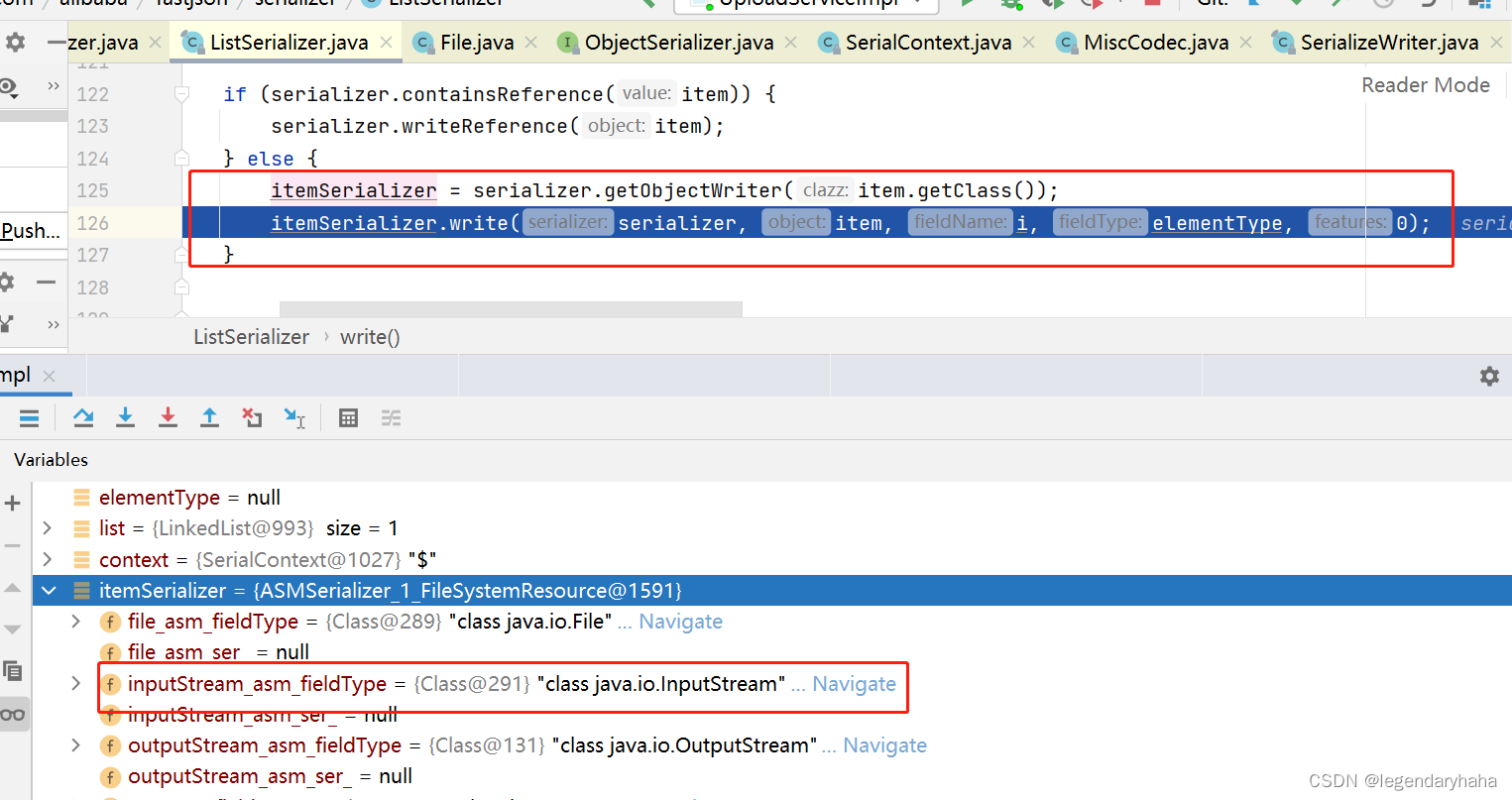-
一行日志,让整个文件导出服务导出内容都为空..
问题
直接上代码,看看有无眼尖的小伙伴发现问题:
// 设置参数 MultiValueMap<String, Object> param = new LinkedMultiValueMap<>(); FileSystemResource resource = new FileSystemResource(file); param.set("token", "XXXXXX"); param.set("file", resource); LOGGER.info("开始文件上传: {}", JSONObject.toJSONString(param)); httpsRestTemplate.postForObject(uploadParam.getUrl(), param, HashMap.class); LOGGER.info("文件上传结束");- 1
- 2
- 3
- 4
- 5
- 6
- 7
- 8
分析
本人企图在上传文件的时候,把请求参数打印出来(为了分析问题),输出方式用 FastJSON 中的方法**JSONObject.toJSONString()**序列化了一下参数 。在实际导出的过程中,发现所有导出导出的文件内容为空,百思不得其姐。
于是进入 toJSONString() 方法,一路Debug进来,到了ListSerializer 这里,如下图:

itemSerializer这里实际对象是ASMSerializer(关于这玩意,查了一些资料,在FastJSON中使用它来实现反射),而在处理反射的过程中,会调用get方法获取属性值执行序列化。而在FileSystemResource 中,关于OutputStream 的获取,是会重新new一个FileOutputStream,再往方法里面看,发现了append属性为false,相当于按原来的路径重新写入了一个新文件,而且是不追加的方式。到这里也算明白了为啥我的文件导出来都为空了。
//
public class FileSystemResource extends AbstractResource implements WritableResource { //.... public OutputStream getOutputStream() throws IOException { return new FileOutputStream(this.file); } } public FileOutputStream(File file) throws FileNotFoundException { this(file, false); } public FileOutputStream(File file, boolean append) throws FileNotFoundException { String name = (file != null ? file.getPath() : null); SecurityManager security = System.getSecurityManager(); if (security != null) { security.checkWrite(name); } if (name == null) { throw new NullPointerException(); } if (file.isInvalid()) { throw new FileNotFoundException("Invalid file path"); } this.fd = new FileDescriptor(); fd.attach(this); this.append = append; this.path = name; open(name, append); }- 1
- 2
- 3
- 4
- 5
- 6
- 7
- 8
- 9
- 10
- 11
- 12
- 13
- 14
- 15
- 16
- 17
- 18
- 19
- 20
- 21
- 22
- 23
- 24
- 25
- 26
- 27
- 28
- 29
- 30
- 31
- 32
- 33
- 34
小结
- JSONObject.toJsonString 使用还是得慎重
- 复杂对象序列化时,特别是一些框架封装的对象还是得多多留意
-
相关阅读:
数学分析_笔记_第2章:实数与复数
【C语言】字符函数和字符串函数(1)
java-php-python-贵州省高考本科志愿填报指导系统计算机毕业设计
机器学习——异常检测
word统计全部字符数。
四句话,让我掌握了工厂模式!
SpringMVC相关知识点
动态内存管理
sqlite3
程序设计与算法(三)C++面向对象程序设计笔记 第九周 标准模板库STL(二)
- 原文地址:https://blog.csdn.net/legendaryhaha/article/details/127937684
